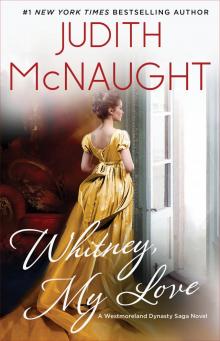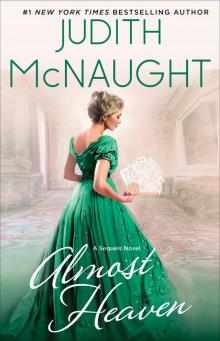- Home
- Judith McNaught
Until You Page 5
Until You Read online
Page 5
At the keyhole, Sheridan realized only that a fine insult had just been scored against the “foul-minded, spiteful spinster,” and she clamped her hand over her mouth to stifle a cheer. Unfortunately, Aunt Cornelia wasn’t as undone by her brother-in-law’s insults as Sherry would have liked. She lifted her chin, looked him right in the eye, and retorted with icy disdain, “I think there was a time when you wouldn’t have needed liquor, wasn’t there, Patrick?”
Sherry didn’t have the slightest notion what Aunt Cornelia meant. For a second, her father seemed blank too, and then furious, and then . . . strangely calm. “Well done, Cornelia,” he said mildly. “Spoken just like Squire Faraday’s haughty, oldest daughter. I’d almost forgotten that’s who you used to be, but you haven’t, have you?” The last traces of his anger drained away completely as he looked around at the drab little room, and he shook his head, smiling ruefully. “Never mind that you live in a house that’s hardly bigger than a broom closet at Faraday manor, or that you eke out a living by teaching etiquette to other people’s children, you’re still Squire Faraday’s daughter, proud and haughty as ever.”
“Then perhaps you’ll also remember,” Aunt Cornelia said in a quieter, but unyielding, tone, “that Sheridan’s mother was my only sister. And I tell you truly, Patrick, that were she alive to see the antidote . . . the laughingstock . . . that you’ve made of Sheridan, she would be horrified. No,” Aunt Cornelia said with absolute finality, “she would be ashamed of her.”
On the other side of the door, Sheridan went rigid with bewildered alarm. Ashamed of her? Surely, her mama wouldn’t be ashamed of her, not of Sheridan; she’d loved Sheridan. Visions of her mother at the farm swirled through her mind . . . her mama putting dinner on the table and wearing a clean, starched apron, her hair wound into a neat coil at her neck . . . her mama brushing Sheridan’s hair with long strokes until it crackled . . . her mama leaning closer to the light as she fashioned Sheridan a “special dress” from scraps of lace and cotton someone had traded them.
With a vision of her mother’s starched apron and shiny hair still in her mind, Sheridan spread her arms wide and looked down at herself. She was wearing men’s boots because she didn’t like to bother with laces, and they were scuffed and dusty. Her buckskin pants were stained, not to mention worn thin at the seat; around her waist a braided belt that Dog Lies Sleeping had made for her was serving the dual purpose of holding her pants up and her jacket closed. Ashamed . . .
Involuntarily, she turned to the little looking glass on her aunt’s washstand and moved closer to it to peer at her face and hair. The image in the mirror made her rear back in alarm; then she stopped and blinked her eyes and gave her head a shake to chase the vision away. For a moment she stood stock-still, completely at a loss as to what to do to fix matters, then she raised her hands to her head and tried to comb her fingers through the tangled mass of long, “wanton” red hair. Her fingers stopped, unable to penetrate more than a few inches into the snarls, so she tried to remedy things by putting her palms against the sides of her hair and pressing down hard. Then she warily approached the mirror again. Ever so cautiously she lifted her hands away. Her hair sprang back out. She didn’t in the least look like her mother. She didn’t actually resemble any female she’d ever seen—a fact that she’d been both aware of, and unconcerned with, until that moment.
Aunt Cornelia had said she looked like a . . . laughingstock, and now that Sheridan thought about it, people had been reacting to her a little oddly lately—especially men. They stared at her in a peculiar way. Lustfully? Her father obviously hadn’t noticed it, but in the last year, Sheridan’s chest had been swelling quite embarrassingly and sometimes it showed no matter how carefully she tried to keep her jacket closed.
Aunt Cornelia said she looked wanton. Wanton? Sheridan furrowed her brow, trying to recollect when and how she’d heard that word used. “Wanton” had some sort of connection to a harlot . . . a hussie . . . A “wanton” hussie! That was it! That was Sheridan?
An unfamiliar lump of tears swelled in her throat at the realization. Aunt Cornelia was probably right about that and everything else—and, worst of all, that Sheridan’s mama would be ashamed of her now.
Ashamed.
Sheridan was so stricken that she simply stood there, immobilized. Minutes later she realized that her aunt was demanding that Sheridan be left with her so that Sheridan could have a decent home and upbringing, and that Sheridan’s father was putting up only a feeble protest. When it finally sank in, she bolted forward, tripping over her aunt’s silly footstool in her haste, and yanked the door open. “No, Papa, don’t! Don’t leave me here! Please!”
He looked haunted and torn, and Sheridan took advantage of his indecision, flinging herself into his arms. “Please, I’ll wear ladies’ boots and fix my wanton hair, and everything else, but don’t leave me here.”
“Don’t, darlin’,” was all he said, and she sensed that she was losing the battle.
“I want to go with you and Rafe and Dog Lies Sleeping! That’s where I belong, no matter what she says!”
Sheridan was still saying that the next morning when he left. “I’ll be back before you know it,” he said firmly. “Rafe has some good ideas. We’ll make ourselves a pile of money, and we’ll all come back for you in a year—two at the most. You’ll be all grown up by then. We’ll go to Sherwyn’s Glen, and I’ll build us that grand house, just like I promised you, honey. You’ll see.”
“I don’t want a grand house,” Sheridan cried, looking first at Rafe, who was standing in the street, looking handsome and grim, and then at Dog Lies Sleeping, whose expression revealed nothing. “I just want you and Rafe and Dog Lies Sleeping!”
“I’ll come back before you know I’m gone,” he’d promised, ignoring her sobs and giving her his warm, Irish smile that ladies always found so appealing. In a stroke of inspired cajolery, he added, “Think how shocked Rafe will be when we come for you and you’re a lovely young lady, wearing skirts and . . . and doing the things your aunt will teach you.”
Before she could protest, he untangled her arms from around his neck, put his hat on, stepped back, and looked at Cornelia. “I’ll send what money I can to help out.”
Cornelia nodded as if accepting alms from a peasant and said nothing, but her manner didn’t seem to disturb him in the least.
“Who knows,” he said with a roguish grin, “maybe we’ll even take you back to England with us. You’d like that, wouldn’t you, Nelly—living right under Squire Faraday’s nose, holding court in a house bigger than his? I seem to remember that the drawing room was always filled with your beaux.” With a mocking smile, he added, “None of them were good enough for you, though, were they, Nelly? But then, maybe they’ve improved with age.”
Sheridan, who was trying to breathe slowly so she wouldn’t weep like a baby, watched him shrug his shoulders in utter indifference at her aunt’s rigid silence, then he turned and gave Sheridan a quick, hard hug. “Write to me,” she implored him.
“I will,” he promised.
When he left, Sherry turned slowly to look at the expressionless face of the woman who had caused the complete destruction of her life and who was her only living female relative. Her gray eyes brimming with tears, Sherry said very softly and very clearly, “I . . . I wish we’d never come here. I wish I’d never set eyes on you! I hate you.”
Instead of slapping her, which Sherry knew she was entitled to do, Aunt Cornelia looked her straight in the eye and said, “I’m sure you do, Sheridan. I daresay you’ll hate me much more before this is over. I, however, do not in the least hate you. Now, shall we have a bit of tea before we begin your lessons?”
“I hate tea too,” Sheridan informed her, lifting her chin to its haughtiest angle and returning her aunt’s stony stare—a stance that was not only instinctive but identical to her aunt’s. Her aunt noticed the similarity, even though Sheridan was unaware of it. “Do not try to stare me out of countenance with that expre
ssion, child. I perfected that very look long ago, and I’m quite immune to it. In England, it would have served you well, were you Squire Faraday’s acknowledged granddaughter. However, this is America, and we are no longer the proud Squire’s relations. Here we are shabby-genteel at best. Here, I teach deportment to the children of people whom I would have once regarded as my inferiors, and I am lucky to have the work. I thank my Maker that I’m able to have this cozy house for my very own, and I do not look back at the past. A Faraday does not lament. Remember that. And I am not completely regretful of my life’s choices. For one thing, I am no one’s puppet anymore. I no longer awaken wondering what sort of uproar will occur today. I lead an orderly, quiet, respectable life.”
She stepped back as she finished that speech, and with something that might actually have been amusement, she surveyed her unmoving niece. “My dear, if you wish to carry off that look of stony hauteur to its best advantage, I recommend that you look down your nose at me just the tiniest bit—yes, just so. That’s how I would have done it.”
If Sheridan hadn’t been so forlorn and so bitter, she would have laughed. In time, she learned to laugh again—just as she learned Latin and ladylike behavior. Her aunt was a relentless teacher, determined that Sheridan learn everything she herself knew, and yet Sheridan soon realized that beneath her aunt’s formal rigidity, there was a deep concern and even affection for her wayward niece. Sheridan was a quick student, once she got over her resentment. Book learning, as she discovered, helped to relieve the tedium of a life that no longer involved wild rides on spotted horses or the humming of guitar strings or laughter under the stars. Exchanging even a nodding glance with a member of the opposite sex was evidence of easy virtue and, therefore, forbidden; striking up a conversation with a stranger verged on criminal behavior. Singing was done only in church, and never, ever, ever was one to accept payment in any form for it. In place of the exhilarating things she used to enjoy, there was the dubious challenge of learning to pour tea while holding the pot at just the right angle, of placing one’s fork and knife in the correct place after dining—trivial things, to be sure, but as Aunt Cornelia said, “Knowing how to behave is your most valuable asset—your only one, in our circumstances.”
Her reasoning became evident when Sheridan turned seventeen: Garbed in a simple brown gown with her hair tucked into a neat chignon, held in place by a cap she’d crocheted herself, Miss Sheridan Bromleigh was presented to Mrs. Adley Raeburn, the headmistress of the school where Aunt Cornelia taught. Mrs. Raeburn, who had come to the house at Aunt Cornelia’s invitation, stared for a split second at Sheridan’s hair and face—a peculiar reaction from city people that had become more pronounced of late. A few years ago, a younger, less well-bred and serene Sheridan Bromleigh would have self-consciously looked down at her boots or tugged her hat down over her face or else demanded to know what the stranger was gaping at.
But this was a new Sheridan, a young woman who was well aware that she had been a financial burden. Now she was determined to become a wage-earner, not only for her aunt’s sake, or merely for the present, but for her own sake and for always. In the city, she had seen the face of widespread poverty and hunger—things that had seemed rare in the country. Sheridan was a city dweller now, and likely to remain so for the rest of her life. In the last two years, her father’s letters, which had come frequently at first, had ceased altogether. He wouldn’t simply forget her here, of that she was sure, and the possibility that he might be dead was so unbearable that she couldn’t endure it. That left her no choice except to find a way to look after herself and to tell herself that it was only until he and Rafe came for her. She told herself that as Mrs. Raeburn said courteously, “I’ve heard some very good things about you from your aunt, Miss Bromleigh.”
And Sheridan Bromleigh, who once would have shoved her hands into the waistband of her pants and replied with blunt shyness that she couldn’t think what those good things might have been, stretched out her hand instead, and replied with equal courtesy, “and I of you, Mrs. Raeburn.”
Now, as Sheridan stood below decks on the Morning Star, she suddenly realized there was a very good chance she would never see any of the people from her old life again; not Aunt Cornelia, or the little girls at school or the other teachers who’d become her friends and who gathered at the house every Saturday afternoon for tea and conversation. She might never again set eyes on their smiling faces. Or on Rafe . . . or her father.
Her mouth felt dry and at the same time wet tears stung her eyes as she thought of the father she might never see again. When he finally appeared at Aunt Cornelia’s, anxious to see her and explain the reason for his long silence, she wasn’t going to be there. . . . She might never know what happened to him.
She closed her eyes and could almost see Rafe and Dog Lies Sleeping and her father standing in her aunt’s parlor, waiting to see her. She’d brought all of this on herself by insisting on accompanying Charise on this voyage, and money hadn’t been her only motive. No, indeed. She’d been daydreaming about England ever since she’d started reading those romantic novels. They had sparked her longing for adventure, ignited the streak of dreamy recklessness that she hadn’t been able to completely conquer, despite her aunt’s diligent efforts, and her own.
Well, she was certainly having an adventure! Instead of sitting in a classroom, surrounded by little faces listening with rapt attention as she read them a story or taught them to walk decorously, she’d landed herself in a strange, unfriendly country—trapped, defenseless, and completely devoid of the wit and courage on which she’d prided herself, preparing to face a nobleman who, according to Meg, would not be required by British law to govern his justifiable rage or delay his vengeance when she told him what had happened. What she, in her pride, had allowed to happen.
Fear, the weakness Sheridan despised above all others, spread through her, evading her efforts to subdue it, and she shivered uncontrollably at the thought of the misery she had caused everyone who trusted and loved her. After a lifetime of determined optimism and robust health, she suddenly felt weak, frantic, and alarmingly dizzy. The room began to revolve, and she clutched at the back of a chair for support; then she forced her eyes open, drew a deep breath, and smoothed her hair back into its stern chignon as she reached for her cloak and aimed a reassuring smile at the terrified maid.
Trying to sound flippant, she said, “It’s time to meet the beastly baron and face my fate,” then she sobered and ceased trying to pretend there was no need for alarm. “You stay here, out of sight. If I don’t come back for you right away, wait for a few hours and then leave as quietly as you can. Better yet, stay aboard. With luck, no one will discover you until the ship is already under way in the morning. There’s no point in both of us being arrested and hauled away, if that’s what he decides to do.”
7
After the relative quiet of their tiny, dim cabin, the noise and bustle on the torchlit deck was jarring. Stevedores with trunks and crates on their shoulders were swarming up and down the gangplank, unloading cargo and taking on new provisions for the Morning Star’s voyage the next day. Winches creaked overhead as cargo nets were slung over the side of the vessel and lowered onto the pier. Sherry picked her way carefully down the gangplank, searching among the throngs for a man who looked like her notion of a villainous English nobleman—a thin, pale, overbred, pompous male with a streak of cruelty was certain to be decked out in satin knee breeches and dripping with fobs and seals to impress his bride.
And then she saw the tall, dark man standing on the pier, impatiently slapping his gloves against his thigh, and she knew in an instant it was he. Despite the fact that he was wearing dark trousers, not knee breeches, and that when the wind blew his cloak open, there wasn’t a gleaming fob or golden seal in sight, everything about him still set him apart and stamped him indelibly as “privileged.” His square jaw was set with cool purpose, and there was a confident strength emanating from every inch of his broad-shouldered
frame, right down to the tips of his shiny boots. He was already frowning as he watched her approach, and Sherry’s fear promptly escalated to panic. For the past two days, she’d secretly counted on her own ability to calm and cajole the affronted bridegroom into seeing reason, but the man whose dark brows were drawn together in a scowl of grim displeasure looked about as malleable as granite. He was doubtlessly wondering where the devil his fiancée was and why Sheridan Bromleigh, not Charise Lancaster, was walking down the gangplank. And he was clearly annoyed.
Stephen wasn’t annoyed, he was stunned. He’d expected Charise Lancaster to be a giddy seventeenor eighteen-year-old with bouncing curls and rosy cheeks, decked out in ruffles and lace. What he saw in the flickering shadows of the torches was a composed, pale young woman with high cheekbones and extraordinarily large, light eyes that were set off by gracefully winged, russet brows and a luminous fringe of long lashes. Her hair was an indeterminate color, pulled back severely off her forehead and concealed with a hood. Instead of ruffles, she was wearing a sensible, but unattractive, brown cloak, and his first thought as he held out his hand to shake hers was that Burleton must have been either mad or blind to describe her as “quite a pretty little thing.”

 Miracles
Miracles Paradise
Paradise Every Breath You Take
Every Breath You Take Until You
Until You A Kingdom of Dreams
A Kingdom of Dreams Whitney, My Love
Whitney, My Love Night Whispers
Night Whispers Something Wonderful
Something Wonderful Someone to Watch Over Me
Someone to Watch Over Me Almost Heaven
Almost Heaven Double Exposure: From a Gift of Love
Double Exposure: From a Gift of Love Tender Triumph
Tender Triumph Once and Always
Once and Always Double Standards
Double Standards